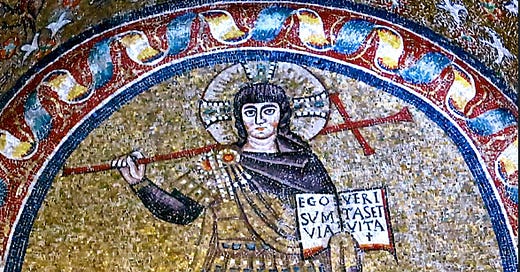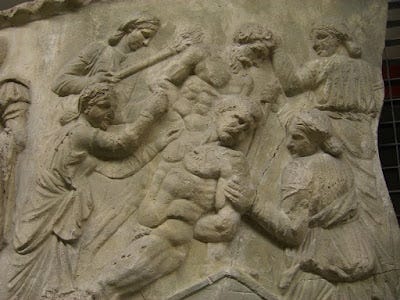While we are waiting for the results of the US elections, I thought you might be interested in a post of mine which I published on the “Cassandra’s Legacy” blog in 2014. It seems to be especially suitable for the current moment, when we can be sure that we will be subjected to a new barrage of lies in the coming days. Above, a Byzantine Mosaic in Ravenna, Italy. The text says “Ego Sum Via, Veritas, et Vita.” (“I am the way, the truth, and life”).
The Empire of Lies
From “Cassandra Legacy” — 2014 (revised)
The Trajan Column was built to celebrate the victories of the Roman Armies in the conquest of Dacia during the 2nd century AD. It shows that the Romans knew and used propaganda. Here, for instance, we see Dacian women torturing Roman prisoners in a brazen "perception management" operation. In those times, just as in ours, a dying empire could be kept together by lies, but not forever.
At the beginning of the 5th century AD, Augustine, bishop of Hippo, wrote his "De Mendacio" ("On Lying"). Reading it today, we may be surprised at how rigid Augustine was in his conclusions. According to him, a Christian could not lie in any circumstances whatsoever, not even to save lives or to avoid suffering for someone. The material body, said Augustine, is nothing; what's important is one's immortal soul. Later theologians softened these requirements, but Augustine's logic was based on the needs of his time: the last century of the Western Roman Empire.
By the time of Augustine, the Roman Empire had become an Empire of lies. It still pretended to uphold the rule of law, to protect the people from invaders, and to maintain the social order. But all that had become a joke for the citizens of an empire by then reduced to nothing more than a giant military machine dedicated to oppressing the poor to maintain the privileges of the rich. The Empire itself had become a lie; that it existed because of the favor of the Gods who rewarded the Romans because of their moral virtues. Nobody could believe in that anymore: it was the breakdown of the very fabric of society. It was the loss of what the ancients called the auctoritas, the trust that citizens had in their leaders and the institutions of their state.
Augustine was reacting to all this. He was trying to rebuild the "auctoritas" not in the form of the power of an oppressive government, but in the form of trust. So, he was relying on the highest authority of all, God himself. He also built his argument on the prestige the Christians had gained with their martyrs. And not just that. In his texts, particularly in his "Confessions," Augustine opened himself completely to his readers, telling them his thoughts and sins in minute detail. It was, again, a way to rebuild trust by showing that he had nothing to hide.
Augustine and other early Christian fathers were engaged in an epistemological revolution. Paulus of Tarsus had already understood this point when he had written: "Now we see as in a mirror, darkly, then we'll see face to face." It was the problem of truth; how to see it? How to determine it? In the traditional view, the truth was reported by a witness who could be trusted. The Christian epistemology started from that to build the concept of truth as the result of divine revelation. The Christians were calling God himself as a witness.
It was a spiritual and philosophical vision but also a very down-to-earth one. Today, we would say that the Christians of late Roman times were engaged in “relocalization,” that is, abandoning the expensive and undefendable structures of the old Empire to build a new society based on local resources and local governance. The age that followed, the Middle Ages, was a time of economic decline but a necessary adaptation to the changed conditions. Eventually, all societies must come to terms with Truth. The Western Roman Empire could not do that, and it had to disappear. Lies can be pervasive but do not last forever.
Now, let's move forward to our times, and we have reached our empire of lies. I don't have to tell you anything you don't already know about the current situation. During the past few decades, the mountain of lies tossed at us by governments has been perfectly matched by the disastrous loss of trust in our leaders on the part of the citizens. Perhaps the watershed of this collapse of trust was with the story of the "Weapons of Mass Destruction" that we were told were hidden in Iraq. And the proof was a little vial of white powder held in the hand of Colin Powell, the Secretary of State. Supposedly, it was an amount sufficient to starting a devastating bacteriological attack on the United States. In practice, it was not more true than the nuns of the Abbey of Loudun consorting with demons during the 17th century in France. It was not their first lie, and not the last, either. But how can you ever trust institutions that lied to you so brazenly, and that continue to do so?
A perverse effect of this tsunami of lies is that every statement from a government or an even remotely "official" source seems to generate a parallel and opposite statement of denial. Unfortunately, the opposite of a lie is not necessarily the truth, and that has originated baroque castles of lies, counter-lies, and counter-counter lies. Think of the story of the 9/11 attacks in New York. Somewhere, hidden below the mass of legends and myths that have piled up on this story, there has to be the truth, some kind of truth. But how to find it when you know that search engines are rigged to show you only what the powers that be want you to see?
Think of peak oil. At the simplest level of conspiratorial interpretation, peak oil can be seen as a reaction to the conspiracy of the oil companies that hide the depletion of their resources. But you may also see peak oil as a scam created by oil companies that try to hide the fact that their resources are abundant - even infinite in the diffuse legend of “abiotic oil.” But, for others, the idea that peak oil is a scam created to hide abundance may be a higher-order scam created to hide scarcity. Even higher-order conspiracy theories are possible. It is a fractal universe of lies where you have no reference point to tell you where you are.
Eventually, it is an epistemological problem that goes back to Pontius Pilate's statement, "What is truth?" Where are we supposed to find the truth in our world? Perhaps in science? But science is rapidly becoming an appendage of the powers that be, people whom nobody believes any longer after they failed to deliver their promises of energy too cheap to meter, space travel, and flying cars. To say nothing about the various scams recently pushed on us in the name of “science.”
Then, we tend to seek truth in such things as "democracy" to determine the truth. But democracy has become a ghost of itself. How can citizens make an informed choice after we discovered the concept of "perception management" (earlier called "propaganda")? How can we trust the results of an election when it is so easy to rig the voting machines? What sense does it make a democracy that looks more and more like the old joke about the Ford T? (You could buy it in any color, as long as it was black.)
The problem is that believing that authorities are lying to us is not a form of epistemology. At least, not in the form it takes today, with plenty of people choosing to disbelieve anything and everything that can be even remotely connected to official sources. Once you decide to take that attitude, you lock yourself in an epistemological black box and throw away the key. If scientists tell you that the Earth is round, you don’t have to assume it is flat. If scientists tell you that vaccinations are good, you don’t have to assume that all vaccines are designed with the specific purpose of killing you. If scientists tell you that human actions are changing Earth’s climate, you don’t have to believe that it is a scam designed to beggar you.
Is it possible to think of an "epistemology 2.0"? Something that would allow us to regain trust in our institutions and in our fellow human beings? Maybe, but right now, we are seeing things as in a mirror, darkly. Something is stirring out there, but it has not yet taken a recognizable shape. Maybe it will be a new ideal, maybe a revisitation of an old religion, maybe a new religion, maybe a new way of seeing the world. We cannot say which form the new truth will take, but we can say that nothing new can be born without the death of something. And that all births are painful but necessary.









Ugo--
As we await tomorrow's election day in the Empire, it's clear that we have a choice between a person whose lies have deteriorated to the point where the truth can be seen behind the decaying facade, and a person whose lies might hold the world together for another four years or so. If, as Freud indicated, civilization itself is a lie, we folks depending on civilization for our comfort and sustenance might want to vote for the more credible liar. It's not like the truth is going to set us free in this case.
The irony is that we have, in the scientific method, a reasonably reliable way of determining small truths that can eventually accumulate into a workable world-view. You can go further if you look at the chapter on critical thinking in Carl Sagan's great work, The Demon-Haunted World. I used to teach it in my writing classes, and if it didn't make my students better writers, it at least made them better thinkers.
John
Civilization requires Trust.
Trust leads to Complacency,
...leads to Corruption,
...leads to Distrust,
...leads to Investigation,
...leads to Confirmation (Truth),
...leads to Trust.
It's a cycle. I think we are stuck in step 2.